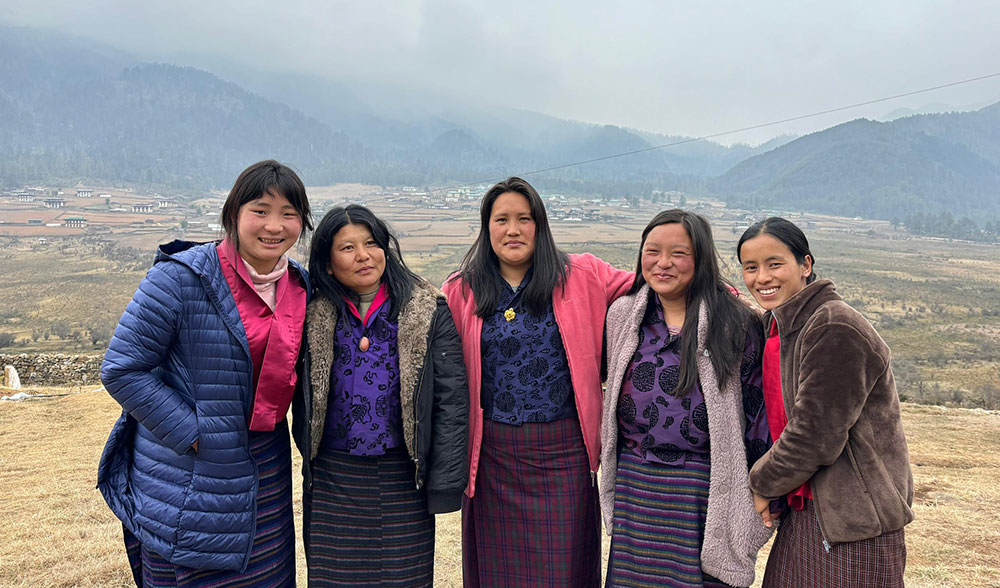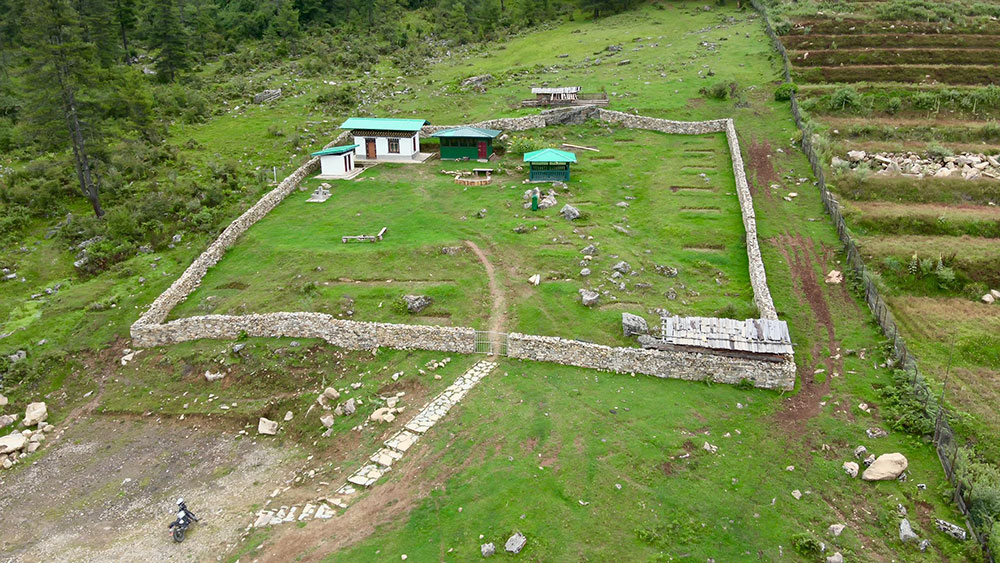Yangyel Lhaden
When five women participated in culinary training in their gewog, they had no idea about the opportunities that lay ahead. This simple act of learning marked the beginning of a journey filled with possibilities.
At the end of the training, the participants were presented with the chance to fully manage a campsite in their village in Gangtey-Phobjikha. Delighted by the prospect, the women eagerly seized the opportunity.
The Gangtey-Phobji Eco-Camp, spread across half an acre, is located in Dazijab, under Phobjikha Gewog, away from the Ramsar site, and stands as the sole campsite managed by the community.
Positioned in this locale, the campsite offers a breathtaking panoramic view of the-Gangtey-Phobjikha valley.

Left-Right: Karma Wangmo, Nim Bidha, Tshering Chezom, Phuntsho Choden, and Tandin Wangmo
Meet the remarkable women behind the operation of the camp: Tandin Wangmo, Phuntsho Choden, Tshering Chezom, Karma Wangmo, and Nim Bidha.
The women each with a diverse background, come together at the eco-camp. Their ages span from 24 to 33. Circumstances prevented them from continuing their studies, and some are now managing families and married life. However, the eco camp is a place they can truly call their own which fosters a sense of independence and empowerment within them.
The women chuckle as they fondly recall the humble beginnings of their business back in 2022.
“We were tricked by the visitors, and we hosted them without any pay,” Tshering Chezom said.
Since then, they have welcomed about 90 groups of guests to their eco-camp.
“All the other guests have paid,” Tshering Chezom said, still amused by the memory.
The campsite is thoughtfully designed, surrounded by stacked rock slate walls, a gravel footpath, and a canopy that serves as a welcoming space for hosting guests. The women warmly greet guests with khadar, and offer tents if needed for accommodation.
For those preferring traditional dining experiences, a traditional stove is available in the kitchen, allowing guests to savour authentic Bhutanese cuisine amidst the natural beauty of the Gangtey-Phobjikha valley.
The women also take care of the waste at the campsite and segregate them for recycling.
The establishment of the campsite was made possible through the collaborative efforts of various organisations and initiatives. The Wangdue Forest Division of the Forest and Park Services Department spearheaded the initiative, with funding support from the Bhutan for Life (BFL) programme.
BFL played a crucial role in financing infrastructure development for the entire campsite and access roads in Dazijab, Phobjikha. The women received culinary training with support from BFL, enhancing their skills and capabilities. Other organisations, including the Royal Society for Protection of Nature (RSPN), gewog administration, and the forest office, also provided invaluable support, further bolstering the success of the eco-camp initiative.
“The development of alternative campsite provision is mainly to avoid the issues of visitors camping inside the Ramsar site at Gangtey-Phobjikha,” said BFL’s official, Kuenzang Tobgay. “This further helps in addressing waste management issues at the Ramsar site as women carry out routine waste collection within the campsite.”
Tandin Wangmo, 25, said: “We are grateful for the opportunity and support we have received so far”
“We used to pack lunch and bring it to the campsite,” recalled Phuntsho Choden, 32. “We started with net zero investment,” she added, reflecting on the humble beginnings of their venture.
The families of these women used to question the purpose of running a business when there was no profit, especially when they had to pack lunches for work. For Nim Bidha and Tshering Chezom, the daily commute to the campsite takes an hour each way.
“We had started this, and we had to continue to prove that we are capable of running this camp,” asserted Nim Bidha.
Today, the team is earning enough, and they divide their profits every six months.
“Now, our families are convinced and supportive because money is flowing in,” Tsering said.
This transformation from skepticism to wholehearted support shows the women’s resilience and success in not only achieving financial stability but also gaining recognition for their entrepreneurial endeavours.
The women have another big responsibility in running the camp. They actively create awareness among the Gangtey-Phobjikha community about the importance of Ramsar site and wetland managements, and help generate alternative income for the youths.
What’s next?
The women of the eco-camp harbour aspirations to register their establishment with the Department of Tourism to attract more visitors and generate income to support their community.
“We want to grow our team and engage more youth,” said Karma Wangmo. “A tourism official visited us and suggested how we can improve our services to meet the standards of eco-tourism, and we are committed to working towards it.”
Currently, the women operate the campsite based on by-laws developed with the support of BFL, and they manage it independently. With determination and unity, they are poised to continue their journey, driven by their shared vision of sustainability, empowerment, and community upliftment.
“We as a group do get into arguments, but at the end of the day, we are a team,” Nim Bidha says. “We share a collective spirit to make our eco-camp exemplary in the region,” Phuntsho Choden adds.


